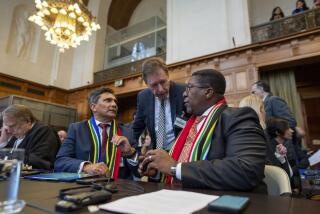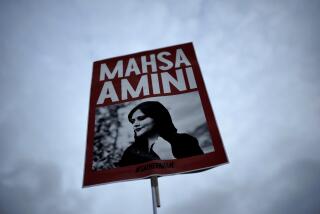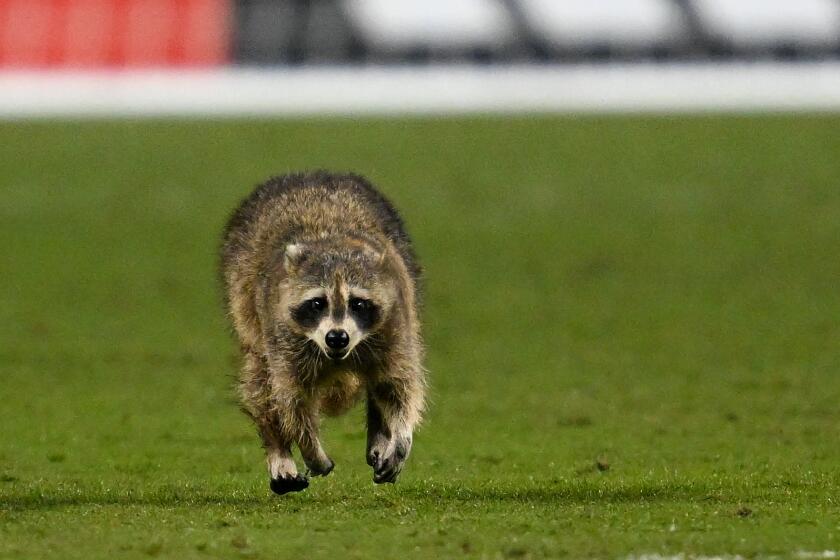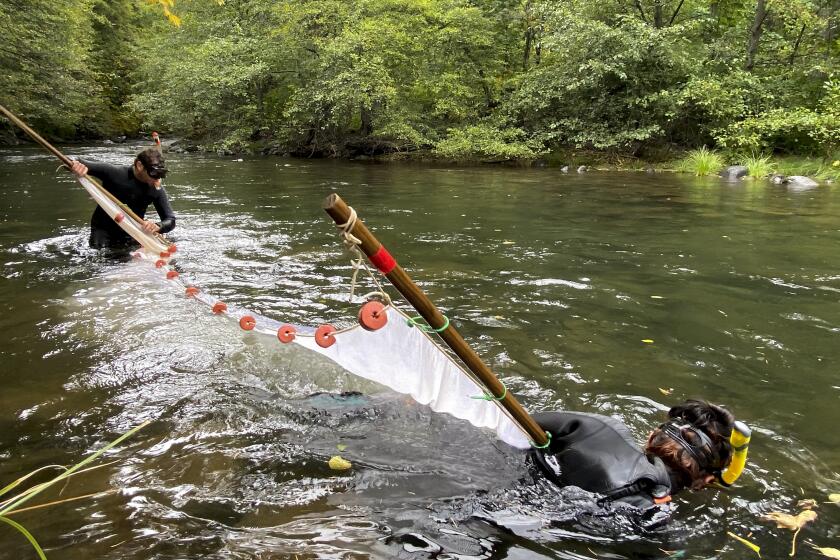Promised Land for Donkeys
Few animals can match the donkey for its biblical reputation.
In the Old Testament, a talking ass saved the prophet Balaam from doom as they plodded down a road toward the angel of the Lord. Balaam couldn’t see the angel, but the donkey could. The animal’s power of spiritual perception, coupled with its newfound voice, spared rider and mount from being struck down by the angel’s flaming sword.
In the New Testament, Jesus made his final entry into Jerusalem seated on a young donkey as residents strewed palm fronds in their path. For Christians, the triumphal ride on Palm Sunday fulfills a prophecy that the long-awaited Messiah would appear in just this way, mounted humbly on a colt.
All that renown was millenniums ago. Nowadays, despite its illustrious pedigree, the donkey is a less-than-exalted creature in the Holy Land, a gentle beast of burden that can’t get any respect.
Instead, what often gets heaped on donkeys is abuse.
Some donkeys here get their ears lopped off by rowdy young boys for no other reason than sport. Others have been doused with gasoline and set ablaze or beaten to death with a hammer--also for fun. Many are painfully hobbled by their owners, who tether them with wire or rope wrapped so tightly around their hoofs that the restraints become embedded in the flesh.
The creatures are even vulnerable to the bloody politics that roil this part of the world. Not long after the current intifada broke out in September 2000, Palestinian militants tried to use an explosives-laden donkey cart to kill Israeli soldiers in the Gaza Strip. The donkey and the cart blew up before they reached the intended target. A few weeks later, another donkey was killed by a grenade thrown by Israeli soldiers who feared it was a walking bomb.
More recently, during a Palestinian protest over Israeli reoccupation of the West Bank, an unlucky donkey, deemed to represent Israel, was paraded among the crowd and then punished by the demonstrators, who sliced off both its ears and its tail, according to animal rights activist Lucy Fensom.
Fensom knows the story because that mutilated donkey is now in her care--along with 42 others she has rescued from neglect and mistreatment over the last 2 1/2 years.
Together they live on a four-acre plot of land in Gan Yoshiya, a small, dust-choked residential neighborhood about an hour’s drive north of Tel Aviv. This is Fensom’s Safe Haven for Donkeys in the Holy Land, a sanctuary she set up for abused and injured donkeys to live out their days in peace.
From here, Fensom, a 31-year-old transplanted Briton, pursues a quixotic but impassioned one-woman campaign to save as many of these animals as possible and to elevate the donkey’s lowly status.
Barriers Are Many
It’s an uphill battle. Complicating her efforts are cultural differences, linguistic barriers, a lack of funds and criticism from those who say she shows more concern for animals than she does for her fellow human beings.
Fensom knows that her efforts can seem frivolous in a place full of so much human misery. But she brushes such complaints aside.
“Yes, I care about people ... but because humans suffer, it doesn’t mean animals have to suffer as well,” she said. “We need balance in the world. We need people who care about people, people who care about kids, people who care about old people and people who care about animals.”
Fensom seems to draw inspiration from her surroundings, an ancient land where donkeys have had roles--even speaking parts--in mystical stories about the human and the divine.
“I definitely feel like there’s some higher source driving me to do this,” Fensom said. “It’s kind of like I’ve been chosen.... I feel like I’m on a mission.”
Fueling her missionary zeal is a deep love of four-legged creatures--about the closest thing there is to a secular religion back in Fensom’s native country. “You know how the English are with animals,” she said.
A British animal rights group gave Fensom the start-up money--about $60,000--to establish her donkey refuge three years ago. England itself is home to the world’s largest donkey sanctuary, in Devon, which has taken in more than 8,300 donkeys since its founding in 1969.
The need for a shelter in Israel occurred to Fensom while she was working for the Jerusalem Society for the Prevention of Cruelty to Animals in the early 1990s. A haggard-looking donkey was often hitched near the society’s offices, brought by its Bedouin master who worked in the factory across the street.
Fensom began tending to the donkey when she could and grew increasingly attached to it. After returning to Britain a few years later, she arranged for the animal to be shipped there--a mission of mercy that caused a minor stir in the British media--and lo, the idea of a promised land for donkeys in Israel was born.
She gave up her job as a British Airways flight attendant and moved back to Israel to establish her donkey haven in late 1999.
Donkeys, Fensom said, are considered “the lowest of the low” in the Holy Land, despite their long association with biblical history, from the ancient judges of Israel who rode on white donkeys to the stable animals that, by tradition, witnessed Jesus’ birth.
Even in the story of Balaam and the talking ass, recorded in the Book of Numbers, the prophet strikes his mount repeatedly with his staff until the angel of the Lord reproves him: “Wherefore hast thou smitten thine ass these three times?”
The donkey’s docile, plodding nature and sturdy constitution have made it an ideal pack animal throughout the Middle East for centuries. In Israel and the Palestinian territories, donkeys are used heavily by Arabs and Bedouins for transport and hauling.
Animals Go for $20
They are the grunts of the animal work force--far less prized than horses, which are expensive and regarded as noble and spirited.
A donkey, by contrast, can be bought for as little as 100 shekels--about $20--so not much value is placed on their welfare.
Every week, Fensom goes on a patrol of nearby villages, looking out for donkeys tied up in fields, pulling carts or simply roaming free, abandoned by owners who no longer have any use for them.
She never goes out without two must-haves by her side. One is a kit stocked with de-worming medicine, antibiotics, syringes, bandages. The other is a man named Jaber Keadan, a veterinarian from a nearby town whom she hires to accompany her.
Keadan, an Arab, acts as a fellow rescuer, translator and mediator, running interference for Fensom in a traditionally male-dominated society. “It’s vital to have him with me, because me alone, it would never be accepted,” she said. “They’d think, ‘Western woman--[she’s] mad.’ ”
On a recent afternoon, under blistering sunshine, the pair went prowling for donkeys in the town of Taybe, about 15 minutes from Gan Yoshiya.
Within an hour, they came upon half a dozen of the animals owned by various local families.
A few appeared to have been treated well, although lack of access to water was a common problem. But another donkey stood alone on a dusty slope, three of its hoofs shackled together with a metal chain and some cord, which had bitten deep into its flesh. The donkey, a male, was too skittish to let Fensom and Keadan tend the wound, bucking and braying in fear.
The youth who owned the creature showed little concern for its welfare. Instead, with some friends, the boy taunted the beast and chucked sticks and stones at it until Keadan ordered him to stop.
“Why can’t he pick on someone his own bloody size?” Fensom muttered, then turned to Keadan. “Jaber, how do we get through to them?”
“They do it because they can, because the donkey is rather a weak animal and won’t complain,” Keadan explained. “Donkeys are replaceable.”
Keadan, 34, is a soft-spoken man with a bushy beard who trained as a vet in Romania for seven years. He hadn’t given much thought to the plight of donkeys until Fensom contacted him. What convinced him to join up with her was the fact that donkeys figure in Islamic teachings too, not just in Judaism and Christianity.
One Islamic story tells of two fallen soldiers whose acquaintances are called on by the prophet Muhammad to testify to their character before burial. Silence reigns, until someone volunteers the fact that he saw the soldiers solicitously watering the horses and donkeys that took them into battle.
“I can guarantee you that these two men are in paradise,” Muhammad responded.
The donkeys Fensom takes home with her are usually already abandoned and therefore more vulnerable to random cruelty.
In rare instances, she has offered to buy donkeys that have especially grievous injuries. Once, when a crowd of onlookers tried to prevent her from rescuing two beaten strays, she lapsed into what she sheepishly calls her “crazy white woman act”--screaming and cursing and generally being furious. She got the donkeys.
Fensom gives a name to every animal she takes in. (There’s no Eeyore, but there is a Harry Potter.) She can describe every donkey’s temperament and foibles as they shamble about their large pen, the air thick with the sweet smell of hay and other, less salubrious odors that attest to the animals’ presence.
They come in many shapes, sizes and colors--gray, brown, russet. Most are females. The males get castrated, though some seem not to notice and have to be segregated from the general population. “We call them the Bad Boys,” Fensom said.
Blind and Earless
Some of the donkeys have had parts of their legs amputated because their restraints had gouged so deep that gangrene set in. One donkey was blinded through mistreatment. A few are missing ears.
Holly and Hannah, two new arrivals brought in by a friend of Fensom’s, had wire wound so tight around their muzzles--for no apparent reason--that it permanently disfigured them, making their faces look more like a camel’s.
“When I saw the wire in their mouths, I said, ‘For God’s sake, what makes people do this kind of thing?’ ” Fensom said.
The pair are now recovering nicely. Fensom has only once had to have a donkey put down.
“They’re much stronger than horses in their ability to cope,” she said. “If something goes wrong with a horse, they go down like that. But donkeys are very hardy. Looking at one, you might never know he’s ill. They suffer in silence--that’s what we say.”
Her work starts practically at dawn every morning and runs through the evening. A skeleton staff helps keep her 43 charges groomed, watered and fed.
When not tending the animals, she edits a newsletter and a Web site (www.safehaven4donkeys.org) for her supporters, most of whom are back in Britain, where her sanctuary is a registered charity. She is trying to drum up interest in her “Adopt-a-Donkey” fund-raising campaign to augment her meager annual budget of about $170,000, which comes entirely from donations. The landlord wants to raise the rent on the property, and she worries that her neighbors may start complaining about the noise and the smell, though so far they’ve been understanding.
Fensom would like to expand her project, both in space and scope.
One dream is for Palestinian and Israeli children to come on tours together to her shelter, where they can learn about the importance of being kind to animals.
“That,” she said, “would be my contribution to the peace process.”
Chu was recently on assignment in Israel.
More to Read
Start your day right
Sign up for Essential California for news, features and recommendations from the L.A. Times and beyond in your inbox six days a week.
You may occasionally receive promotional content from the Los Angeles Times.







